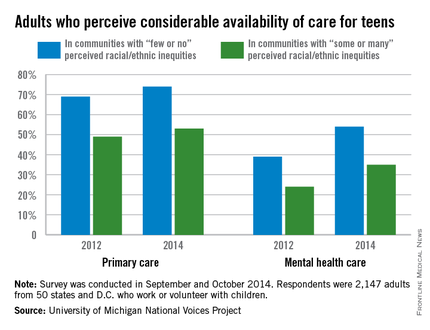Although adult perception of the availability of mental health care for teenagers has increased significantly since 2012, availability was much lower in communities with perceived inequities, according to a report from the National Voices Project.
In communities where adults felt there were few or no racial/ethnic inequities, 54% believed there to be a considerable amount of mental health care available to teens in 2014, up from 39% in 2012. However, if adults felt their community had some or many racial/ethnic inequities, only 35% believed teens had a considerable amount of available mental health care in 2014, up from 24% in 2012.
Overall, 40% of American adults in 2014 felt there were many mental health care options available for teens, compared with 30% in 2012.
The number of adults who believed teens had many primary care options grew slightly from 2012 to 2014, but just as with mental health, there was a big difference between communities with little or no racial/ethnic inequity and those with some or many inequities. In communities with little or no inequity, 74% said there were many primary care options in 2014, compared with only 53% in communities with inequities.
“Mental health services are perceived as much less available than primary health care services for teens,” Dr. Matthew M. Davis, director of the National Voices Project, said in a written statement. “Given how common mental health concerns are among adolescents, improving access to behavioral services is as important as enhancing access to primary care.”
The data were collected by the University of Michigan 2014 National Voices Project Survey, commissioned by the W.K. Kellogg Foundation.


